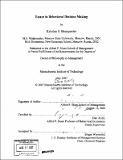Essays in behavioral decision making
Author(s)
Shampanier, Kristina S
DownloadFull printable version (11.46Mb)
Other Contributors
Massachusetts Institute of Technology. Dept. of Electrical Engineering and Computer Science.
Advisor
Dan Ariely.
Terms of use
Metadata
Show full item recordAbstract
Essay 1: Zero as a Special Price: the True Value of Free Products. When faced with a choice of selecting one of several available products (or possibly buying nothing), according to standard theoretical perspectives, people will choose the option with the highest cost-benefit difference. However, we propose that decisions about free (zero price) products differ, in that people do not simply subtract costs from benefits and perceive the benefits associated with free products as higher. We test this proposal by contrasting demand for two products across conditions that maintain the price difference between the goods, but vary the prices such that the cheaper good in the set is priced at either a low positive or zero price. In contrast with a standard cost-benefit perspective, in the zero price condition, dramatically more participants choose the cheaper option, whereas dramatically fewer participants choose the more expensive option. Thus, people appear to act as if zero pricing of a good not only decreases its cost but also adds to its benefits. After documenting this basic effect, we propose and test several psychological antecedents of the effect, including social norms, mapping difficulty, and affect. Affect emerges as the most likely account for the effect. Essay 2: Movies as a Mood Regulation Tool: Movie Watching Patterns Right After September 11. Is a sad person more, less or equally likely than a happy person to pursue a "happy" activity rather than an "unhappy" one (e.g. prefer a comedy to a drama)? Surprisingly, the literature offers theories and laboratory evidence in favor of all three possibilities. In this paper I attempt to resolve the puzzle by moving out of the lab and analyzing the changes in movie watching patterns following the tragic events of Sept. 11, 2001. Two data sets from the 7 weeks surrounding 9/11 are analyzed. One consists of US box office collections of top ten movies during the period. The other contains data on movie rentals in a rental store chain in Cambridge MA. The analysis suggests that the more private the mood-regulating decision is (rental vs. movie going), the more likely is the person to use the movie as a mood repair tool. When the decision is more public (movie going), the appropriateness issues induce more mood congruent behavior. Essay 3: Measuring Liking and Wanting. Recently neuroscientists have gathered a vast body of evidence that wanting (motivated preferences) and liking (non-motivated preferences) are not one and the same. We explore the possibility of measuring the two types of preferences uintrusiveley, in a behavioral lab. In particular we find that wanting and liking for viewing pictures of attractive people are not perfectly aligned and especially for men.
Description
Thesis (Ph. D.)--Massachusetts Institute of Technology, Sloan School of Management, 2007. Includes bibliographical references.
Date issued
2007Department
Sloan School of ManagementPublisher
Massachusetts Institute of Technology
Keywords
Electrical Engineering and Computer Science.